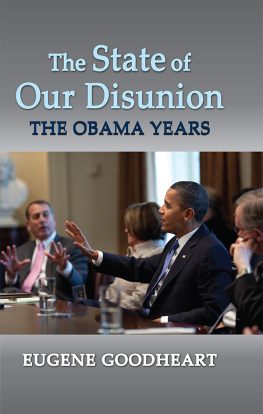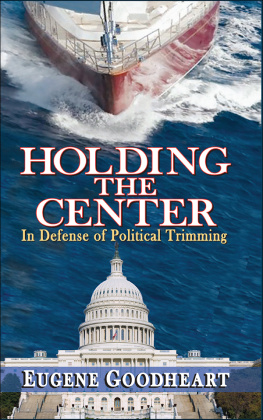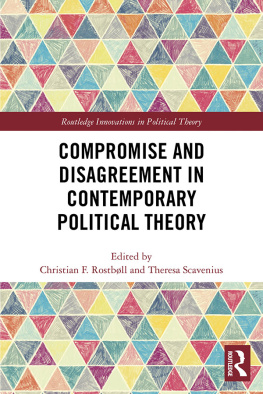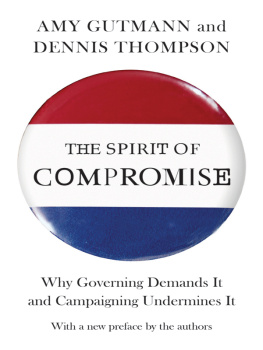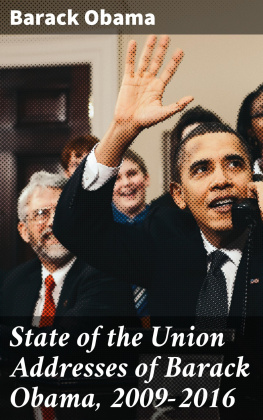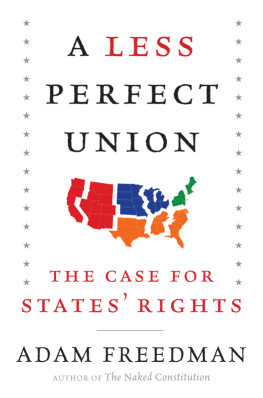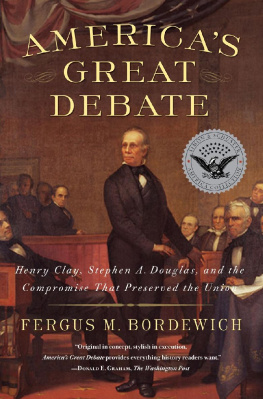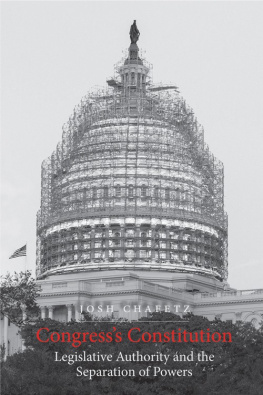The State of Our Disunion
Books by Eugene Goodheart
The Utopian Vision of D.H. Lawrence
The Cult of the Ego: the Self in Modern Literature
Culture and the Radical Conscience
Modernism and the Critical Spirit
The Skeptic Disposition: Deconstruction, Ideology and Other Matters
Pieces of Resistance
Desire and Its Discontents
The Reign of Ideology
Does Literary Studies Have a Future?
Confessions of a Secular Jew
Novel Practices: Classic Modern Fiction
Darwinian Misadventures in the Humanities
Holding the Center: In Defense of Political Trimming
Mostly Grave Thoughts: On Mortality and Other Matters
The State of Our Disunion
The Obama Years
EUGENE GOODHEART
First published 2016 by Transaction Publishers
Published 2017 by Routledge
2 Park Square, Milton Park, Abingdon, Oxon OX14 4RN
711 Third Avenue, New York, NY 10017
Routledge is an imprint of the Taylor and Francis Group, an informa business
Copyright 2016 by Taylor & Francis.
All rights reserved. No part of this book may be reprinted or reproduced or utilised in any form or by any electronic, mechanical, or other means, now known or hereafter invented, including photocopying and recording, or in any information storage or retrieval system, without permission in writing from the publishers.
Notice:
Product or corporate names may be trademarks or registered trademarks, and are used only for identification and explanation without intent to infringe.
Library of Congress Catalog Number: 2015007958
Library of Congress Cataloging-in-Publication Data
Goodheart, Eugene.
The state of our disunion : the Obama years / Eugene Goodheart.
pages cm
Includes bibliographical references and index.
ISBN 978-1-4128-5714-7 (alk. paper) -- ISBN 978-1-4128-6192-2 (alk. paper)
1. United States--Politics and government--2009- 2. Obama, Barack. 3. Divided government--United States. 4. Opposition (Political science)--United States. 5. Political culture--United States. 6. Compromise (Ethics) I. Title.
E907.G66 2015
973.932--dc23
2015007958
ISBN 13: 978-1-4128-5714-7 (hbk)
For my grandson, Alex
Earlier versions of The Constitution: Dead or Alive and Between Liberty and Equality appeared in Society. Thanks to its editor Jonathan Imber for permission to reprint them. Early versions of a number of pieces appeared in the digital magazine firstofthemonth.org. I am grateful to its editor Benjamin DeMott Jr. for his intellectual comradeship and editorial hospitality. A number of friends greatly helped in the thinking and conceiving of the book: Robert Brustein, Morris Dickstein, Leslie Epstein, Bert Silverman, Stephen Whitfield, and the late Sacvan Bercovitch and Michael T. Gilmore. My wife, Joan Bamberger, was a constant presence and reader, whose keen eye was always alert to infelicities in conception and expression.
Contents
The United States is a nation of fifty states of diverse and often conflicting interests, political ideals, and cultural traditions. The country fell apart in the 1860s and was reconstituted with the victory of the North in the Civil War, but the new birth of freedom affirmed in the Gettysburg address did not quite materialize as Lincoln had hoped. It took a century to enfranchise in the law the descendants of the emancipated slaves. Social, cultural, and economic equality remains a work in progress. The well-being of a nation depends upon common agreements and understandings among its citizenry as well as the freedom to debate differences. As we can see from recent congressional action and inaction on voting rights, health care, entitlements, gun control, gay rights, and electoral campaign financing as well as foreign policy, we as a nation are as deeply divided as we have ever been.
The American Revolution may have been a time of revolutionary unity, but in the wake of victory divisions among states came to the fore. The achievement of the Constitution was a masterpiece of compromise. Inevitably differences arose among the states in the understanding of what the various clauses of the Constitution meant, so that in practice what was required in resolving conflicts of interpretation was the very spirit of compromise that created the charter. The main tendency of the Constitution was to resist centralizing power by granting equal powers to the three branches of governmentthe executive, the legislature, and the judiciary as well as rights to the states. The revolution was directed against what was felt to be monarchical tyranny. The risk in the separation of powers is that the absence of the spirit of compromise can lead to the disintegration of the union. This can occur when the separate branches fail to exercise and respect both the powers and the limitations of their individual functions or when the states act as if they do not belong to a union or when political parties cannot find common ground (between and within themselves) to allow for the government to function, the current state of affairs.
In Great Britain, it is still the monarch who gives the name to an historical period, though its politics are the work of the prime minister, who leads the party that controls the legislature and the executive. In the United States, it is the president, though in theory only an equal to the Congress and the judiciary, who defines the period. The eight years between 2009 and 2017 are the years of the Obama administration. It is hard to recall a presidential candidate in the history of the presidency who affirmed the spirit of compromise and the need for adversaries to find common ground with the passion and conviction of Barack Obama. In the speech that first brought him to national attention, he declared that there is no red or blue America, but the United States of America. He was of course speaking in the language of aspiration, not describing an actual state of affairs. In what is surely an historical irony, his presidency has been marked by apparently irreconcilable conflict between the parties and within the parties, even between the President and his base.
The Affordable Health Care Act (Obamacare) is Obamas signature legislation, its enactment the main cause of fierce contention between Obama and the Republicans. Obama did not follow the counsel of advisors, who thought that proposing fundamental, universal health care reform was unwise at a time of financial crisis and high unemployment. It would seem like a distraction from the problems that needed to be immediately addressed. A significant portion of the population was suffering from a lack of health insurance, but health care was not the crisis of the majority, who feared losing insurance or having to pay higher premiums in the wake of reform. The benefits of the Act (insurance coverage of children to the age of 26 and of people with preexisting conditions) notwithstanding, it became stubbornly unpopular. Ideologically opposed to what they viewed as excessive government intrusion into the health care market, the Republicans were empowered in their resistance by the unpopularity of what came to called Obamacare. The convoluted Rube Goldberg construction of the law reflects the tortuous effort of the administration to overcome opposition to it from members of its own party as well as the unanimous resistance from the opposition party. Given the choice to improve the law or repeal it, the Republican-controlled House of Representatives chose unsuccessfully to repeal fifty-six timeswith little concern for consequences, that is, the loss of insurance of millions of people.

